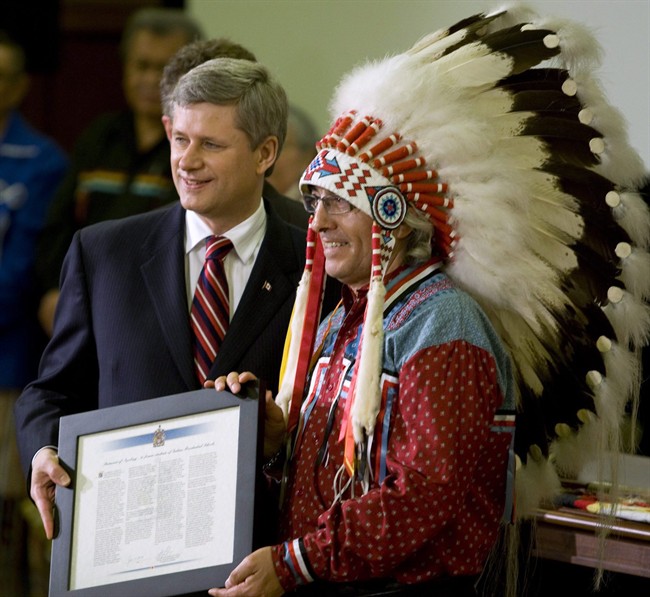OTTAWA – The Conservative government used the legislative blueprint of its throne speech to promise concerted action to help aboriginal communities share in Canada’s social and economic opportunity.

Prime Minister Stephen Harper is promising money and policy changes to improve land management and deliver clean water, clean energy technology and education for native children and adults.
The pledges come as the Prime Minister’s Office and aboriginal leaders work behind the scenes to arrange a summit meeting that would put muscle and sinew on the skeleton of many of these plans.
Harper has long believed that the relationship between the federal government and Canada’s natives has failed to produce policy that improves the standard of living of aboriginal people.
After years of waiting for a formal process to replace the failed Kelowna Accord for fixing First Nations poverty, the Assembly of First Nations says it is now receiving signals from the new Conservative government that a summit meeting to discuss improving that relationship will indeed take place.
There’s no firm date but there are the beginnings of an agenda that could lead to a meeting by the end of this year, both the AFN and the Prime Minister’s Office say.
“There seems to be an expression or an openness to look at doing this. That would be an important first step,” AFN National Chief Shawn Atleo said in an interview.
The PMO and the AFN say the meeting will be tightly focused on improving education, governance and economic development.
The agenda is deliberately narrow, steering clear of the wide-ranging Kelowna Accord, which was difficult to bring together and would have cost at least $5 billion over 10 years.
Harper has made it clear he does not want to revisit that accord or imitate its approach. At the same time, he has promised twice in the last five years to establish a formal process with First Nations.
In the 2006 election campaign, Harper committed to holding a summit with native leaders and premiers within three years. That didn’t happen, but the prime minister said in writing last December that he was still open to the idea.
Following the election, Atleo made a public appeal for the summit. He has since met with Aboriginal Affairs Minister John Duncan on the subject, and now both parties are starting to put meat on the bones.
“Both sides want to see progress on three areas: economic development, governance and education, and we are working together toward this end,” said Andrew MacDougall, a spokesman for Stephen Harper.
The federal government and AFN already have a joint task force plotting the course for improvements in education in primary and secondary schools for First Nations kids.
And there have been intense discussions about how governance and accountability in First Nations governments can be improved, as a similar Conservative private-member’s bill made its way through the House of Commons in the last session only to die with the election call.
The AFN had also hoped to see “community safety and security” on the summit agenda – a huge topic that would touch on child welfare and affordable housing, among other things.
The First Nations-Crown gathering, as they call the proposed summit, comes at a time when Ottawa is pinching pennies to tackle the deficit.
The AFN envisions a government-to-government meeting that would see regional chiefs sitting down with Harper and key ministers involved in aboriginal policy.
Ideally, the meeting would take place before the end of the year so that any agreements could be included in the 2012 budget, said Atleo.
“This is really about setting clear priorities for action. I think the criticisms of the past, rightly or wrongly, have been around process and talk. And what’s required now, is we’ve got reports, reams of them … it’s about getting on with implementation.”
Then the federal government and First Nations leaders would take their agenda to the premiers so that the provinces can complement federal measures.
Indeed, the provinces have long been asking for a joint federal-provincial approach to working with First Nations, since the Kelowna Accord died a quick death in 2006.
Most recently, Ontario Premier Dalton McGuinty called last month for a first ministers meeting on aboriginal issues, noting that all provincial and territorial ministers of aboriginal affairs have lobbied for the same thing.
Now that Harper has a majority and can afford to think long term, Atleo says, there appears to be a new openness to confronting intricate issues such as the plight of First Nations.
“It seems like we’ve been given the opportunity to develop a real robust agenda now.”
But he knows he needs to show Ottawa, and the general public, that there’s something in it for them.
He points out that the basis for the talks needs to be the treaty relationship that has defined Canada from the beginning, a relationship designed to share wealth and prosperity.
First Nations communities are sitting on top of hundreds of billions of dollars worth of natural resources and an untapped source of labour at a time when labour shortages loom, Atleo said.
“There are really compelling economic reasons … to recapture this history and understanding.”




Comments